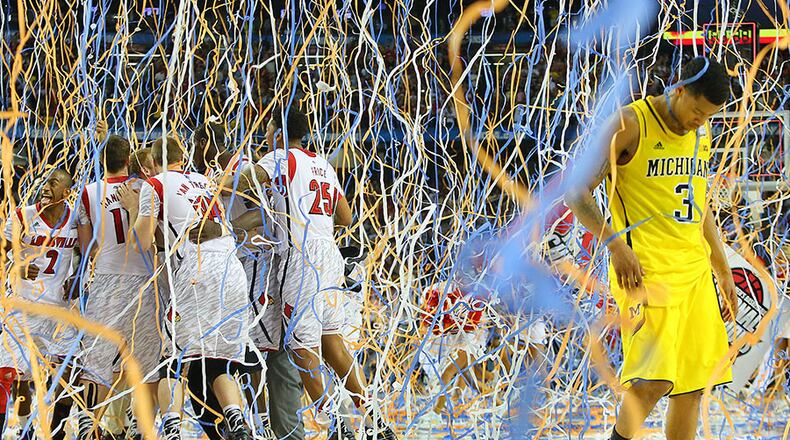NCAA officials are in town regarding Atlanta’s bid to host college basketball’s Final Four in the new Falcons stadium late this decade.
Two college athletic directors who serve on the Division I men’s basketball committee, Northeastern’s Peter Roby and Creighton’s Bruce Rasmussen, and two NCAA staffers are visiting Atlanta as part of the process that will lead to November decisions on where to play the 2017 through 2020 Final Fours. Visits will be completed by the end of September to seven other cities bidding for those events.
On Monday, the visitors met with Atlanta Final Four bid committee members and saw downtown hotel locations and convention space. On Tuesday, they will be briefed on the stadium plans.
Normally, they would get an extensive tour of the proposed venue, but that isn’t possible in this case, of course, since the stadium is in the early stages of construction and not scheduled to be completed until March 2017.
“It’s a unique situation in this case, so I’m anxious to see what kind of virtual tour they give us,” Roby said. “… I think you’re taking a little bit of a leap of faith, obviously, because if you don’t have the finished product in front of you, you’re going on the belief in the people that are doing it. But with technology now … all of us on our campuses have seen facilities built before they ever put a stick in the ground.”
Said Rasmussen: “There are pluses and minuses to everything. I think the real positive to not having a stadium (built) is you can look at what has been successful in other places and you can create it to begin with, rather than having to take what’s there and adapt it to what works. Sometimes we look at facilities that are older and it takes a lot of manipulation to get it to be the way you would like it to be. … What’s amazing to me is how accurate the virtual tours we’ve had on our own campuses or somewhere else are to the finished product.”
Roby and Rasmussen spoke with The Atlanta Journal-Constitution after getting a tour Monday night of the College Football Hall of Fame, the new downtown attraction that opens Saturday.
Among the issues the committee assesses in choosing Final Four sites, they said, are logistics, transportation and attractions that would appeal to Final Four visitors.
“I think it’s also important to look at the community involvement, how much the community has bought into the Final Four, because so much of what is valuable takes place outside the arena,” Rasmussen said.
Atlanta has hosted the men’s Final Four four times previously — 2013, 2007 and 2002 in the Georgia Dome, which will be demolished when the new stadium is completed, and 1977 in the Omni, which was Philips Arena’s predecessor.
“You have a track record of having hosted a lot of events in this city and having hosted a number of Final Fours, and recently,” Roby said. “I would think if there’s any concern or any consternation about not having a venue built, it is mitigated to some extent because the people that have been here for a number of years … have proven themselves on a number of occasions. It’s not their first rodeo.”
Earlier this year, the Division I men’s basketball committee named the eight finalists to bid for the 2017 through 2020 Final Fours. The Dallas Cowboys’ stadium, which was the site of this year’s Final Four, and the Minnesota Vikings’ planned new stadium, which is slated to open in 2016, are among the finalists. Other finalists, in addition to Atlanta, are Indianapolis, New Orleans, San Antonio, St. Louis and Glendale, Ariz.
The 10-member NCAA committee will hear formal presentations from each of the bid cities at its meeting in Indianapolis in November, Roby and Rasmussen said. Shortly after that, the committee will announce the four chosen sites.
The 2017 Final Four is not an option for Atlanta because of the stadium’s construction schedule, but the city is seeking the 2018, 2019 or 2020 event.
The Atlanta bid group includes representatives of the Atlanta Sports Council, which is leading the effort; the Atlanta Convention & Visitors Bureau; the Georgia World Congress Center Authority; Georgia Tech, and the Falcons.
About the Author
Keep Reading
The Latest
Featured



